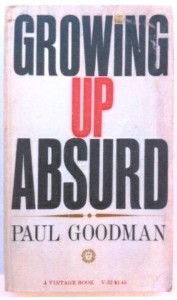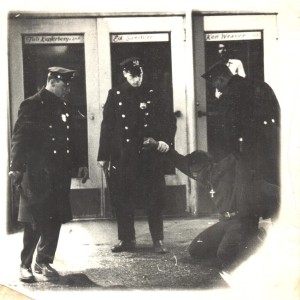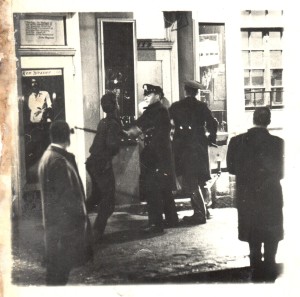“My Bossa Nova Summer” 1962
… Began in mid-Winter with a return to college, later a perfect job, then possible paternity, and finally the first time I would live without a roomate(s.)
.-.-.-.-.- A Slushy Mid-term .-.-.-.-.-
NYU was a real disappointment.
New York University’s Washington Square campus shared space with with the residents of Greenwich Village. Washington Square, and its eponymously ( I have been looking for a way to use, ‘eponymous’ for quite some time.) named arch at the foot of 5th Avenue, was to NYU what the ‘Quad’ was to Harvard. Except that Harvard owned the Quad– NYU did not own Washington Square which was a public park owned by the City.
At this time both institutions continued an expansionist policy beyond their nineteenth century boundaries, to occupy real estate intended for other purposes, or razing structures entirely for construction dedicated to the Universities’ private purposes. As a public park the ‘Square’ attracted Greenwich Villagers unaffiliated with the college. Villagers, whether— sitting, sunning, playing chess, drinking out of containers concealed in brown paper bags, dozing, engaging in fulsome debate, making music, or just “milling” around aimlessly of a Sunday afternoon ( a ‘coinage’ for the equivalent of the Mediterranean custom of paseo (?) around aimlessly of a Sunday afternoon– were all considered loitering vagrants committing trespass by the University,– but not in so many words or for the record. This was the urban version of, ‘town & gown,’ The inevitable friction between the college and the host community. I was a part of the Village long before I was ‘taken on’ by NYU.
My discouragement had begun with the very beginning of the New Year’s mid-term semester. Even as I chose my electives I was informed that I was to take a class in remedial writing because an essay or writing sample I had been required to submit had been found deficient. I finally found the person in the English Department whose literary judgement had put me into remediation. Seated on the edge of a chair in her office I calmly, but with animation, tried to explain that literary efforts should not be susceptible judgement by a literary bureaucrat, “Whoever that person might have been,” I said, adding that I was sure that this person must not have been aware of: “My one act play, “One of the Best in New York,” … been written in my last year of prep school with a fellow student. … been performed before the entire student body and others … Winter Carnival to great laughter, appreciation and, even a favorable review in the school newspaper.”
She sniffed and shuffled her papers, then stopped me before I could continue while she made a phone call– a seemingly very long phone call to her veterinarian. When I was allowed to continue I tried to confidently assert that having come to NYU from a master class of only six students conducted by novelist and screenwriter Calder Willingham, …”Obviously, a mistake’s been made and surely you can exercise your power within the organization to see that right is done and that I be excused.” Altogether, I thought I had been persuasive and even diplomatic, especially, when I had refrained from referring to her literary machine as a paper shuffling bureaucracy of which she was merely a mindless cog.
In spite of these efforts, I still found myself soon thereafter sitting in a large overly steam heated classroom with many rows of seated fellow literary miscreants, all resentful, still in our soggy, only partially unzipped, winter outer garments, as if this discomfort might increase our martyrdom and facilitate our flight at the first opportunity.
As with all first sessions of any class, Remedial Writing .101, being no exception, everyone was given a new form to fill out with a special pencil containing a radio-active graphite point readable by a tabulating machine. I felt that the piling on of each new petty humiliation was a deliberate attempt to further convince me that it was against my best interests to pursue my rapidly cooling interest in institutionalized higher education. But, it did not end here.
While we filled in the little circles on the form with our best choice of multiple guesses, a great commotion at the front of the room caught everyone’s attention. A side door to the classroom slammed open and an apparently distraught woman sobbing and shrieking, “Help me, help me,” rushed past us to the head of the class trying to escape several men who were in pursuit. Our instructor had intercepted her and she was soon in custody, and still struggling taken out of the room through a door on the far side of the room.
The instructor obviously had no need to call everyone to attention.
“Boy, oh boy,” I thought, “This is not theater but a real drama has just unfolded before our eyes.” The instructor made the following announcement. Reading from a card he held in his hand he repeated, “Please turn over your paper forms to the side with the blank lines — You are to remember as much as you can and, while it’s fresh in your mind, write down what you saw in as much detail as you can recall. This is a timed exercise. I will tell you when to stop writing. If you need an additional page, please raise you hand. Please begin …NOW!
Almost everyone seemed to respond to this unorthodox way of getting our literary juices flowing, even myself, who felt flattered at the attention being directed our way. My disappointment though was to now see that this was no spontaneous episode but a contrived event — to what end I could only guess. But the anarchist in me could only wonder, “What would the author of “Jews Without Money,” or, Thomas Wolfe do in this situation?”.
Later that week I was sitting at a table in Harout’s with my usual mid morning breakfast– a bowl of pilaf and a several cups of coffee ($.50.). Harout’s Cafeteria featured a middle eastern menu and was just off the Square and Washington’s arch. It occupied what had been an large show room space on the ground floor of one of several large buildings in and around Waverly Place originally designed when the area was zoned: ‘commercial’ and for ‘light manufacture.’ (The tragic Triangle Shirtwaist fire, in 1910, where many young immigrant women were forced to jumped to their deaths was in the upper floor of a similar building that still existed nearby.) Harout’s was still fronted by two very large plate glass display windows so passersby could check patrons for familiar faces. The ceiling was very high and absorbed sound like the reading room at the big library uptown. It was a wonderful place to hang out, read the paper or finish an assignment before class.
I was finishing up and ready to go when I was joined by an older student I was friendly with. At least I think he was taking classes– auditing them anyway, for sure. He had grown up in The Village and was outspokenly critical of the university’s dealings with the community. He had been associated himself with Jane Jacobs and local residents in a successful campaign to prevent Robt. Moses, Parks commissioner, and, ‘Destroyer of Neighborhoods, from running ‘The Broom Street Interstate Expressway above and through the heart of The Village. He was very much a ‘townie.’ I liked him. He thought I had a lot to learn.
He was always looking to refine his arguments for airing at public meetings or for the informal debates held in the ‘Square’ in the round, dry wading pool, near where, The Fifth Avenue Bus Company vehicles turned around, before beginning their return trip uptown. He liked to practice his oratory on me. I was flattered. He was trying out some new phraseology, “…university is a political and bureaucratic machine– a vampire– out to take over our “Village.” — and ” … poised and ready to suck the life blood of idiosyncrasy and bohemian communality out of the neighborhood.”
He had other opinions on the University’s strategies for aggrandizement and hegemony. Academically, He felt NYU was becoming less of a liberal arts institution and more geared to the needs of business for, a Grey Flannel Suited student who wanted to become an Organization Man (Women were not much mentioned in those days, yet.) He was a big fan of Paul Goodman, a Columbia Prof. whose book: “Growing up– Absurd,” was making the rounds in the book bags of those disenchanted with academia.
I interrupted his polemic as it crescendo-ed; ” …Malefactors using their vast wealth to trade in the souls of those who would taste freedom. ” I wanted to relate the example of the University’s creativity, in the episode of the distraught young wooman. I had barely begun when he started laughing and shaking his head:
“Is the Psych Department still perpetrating that old vaudeville act? I thought everyone was wise to them by now. Pal, they’re using you like lab rats. It’s almost as bad as Milgram’s experiments to see how many potential nazis he can winkle out of the student population.
“What’s a Milgram?” At age twenty I was still fairly stupid about many things .
Speaking more slowly, more deliberately as he considered each word, thinking, “Here’s more perfidy of the University.” He went on—“Stanley Milgram ran a brilliant but psychologically brutal series of tests where a student volunteer, at the prompting of a lab coated ‘authority figure,’ would give successively larger electric shocks to another “student” behind a screen for failure to give correct answers to simple questions. Actually the other student was a plant, part of Milgram’s team and was only feigning pain and agony as the larger and larger shocks were ostensibly administered. But the volunteer didn’t know that and, after all but electrocuting him or her, the student leaves the experiment thinking himself another Doctor Mengele.”
I was a bit stunned at the comparison. “How’s that got to do with the crying lady,” I asked.
“… Up with one red shoe and one blue shoe and a purse on her shoulder and another one clutched in her hand, a wig that’s a bob on one side and a long tress on the other… I don’t think they went as far as to put black makeup on half of her face, but you get the idea. Then they get you lab rats to write about what you saw to test your powers of assumption and inference versus actual observation and they tabulate the results… something to do with a study of the accuracy of eyewitness testimony, I think. Anyway you’ll never see what you wrote down again. It’s not part of your “remedial writing class” at all.”
He looked up at the large clock high on the wall above us and got up to leave. But he couldn’t resist a parting shot at my apparent haplessness at the exploitative ways of the world and the university– “Actually, that’s not a remedial class you’re in at all. They don’t choose you all for that class because they think you’re all literary retards — They choose you all because they think you all are articulate and can write. See what I mean about the University’s hidden agenda?”
He kept chuckling and shaking his head as he walked out, while I sat there in silence and made a note to get myself a copy of, “Growing up– Absurd.”

Paul Goodman thought The way of Education in America was short changing students. By his criteria, it still is.
But my enthusiasm for College, especially sitting in classrooms, only Luke-warm at best, had begun it’s decline until by May I was ready to drop out. Of course, by then other events were crowding into my life.

